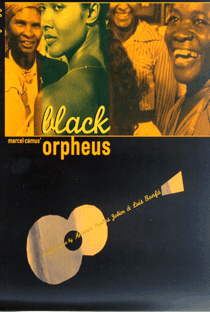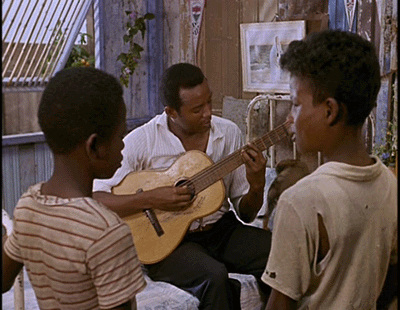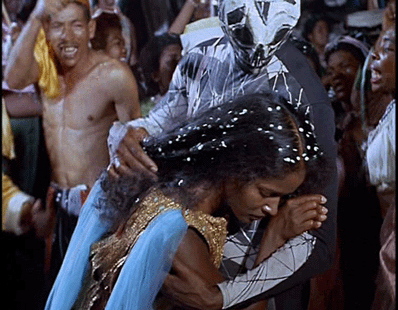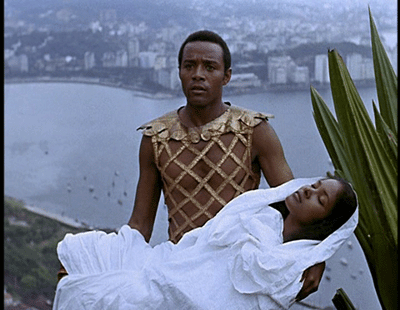
CINEMATIC ALLUSIONS TO LITERARY WORKS
BLACK ORPHEUS (1959)

The story of Orpheus appears in bits and pieces in classical literature rather than in one sustained text, although there is quite a bit in Ovid's Metamorphoses, and in the Argonautica of Apollonius Rhodius it is Orpheus who saves the Argonauts from the Sirens. Marcel Camus's and Vinicius de Moraes's 1959 Black Orpheus, set in Brazil at carnival time, re-engages the power of music to move humans and non-humans alike: it can charm children and women, it can (at least seem to) cause the sun to rise, it can (temporarily) overcome death-but in the end, it is not clear whether its effects will be permanent. It retells the story of the poet/singer Orpheus's love for his wife Eurydice, who dies and is transported to an "underworld" of sorts-a cross between a séance and a vastly empty office building-as well as the story of Orpheus' death at the hands of an angry scorned women, who send him reeling from a precipice. It deals too with the theme of resurrection, as Orpheus' guitar in the hands of a child once more "causes" the sun to rise (i.e., is played at sunrise, and the children therefore believe it has caused the sun to rise).
Jennifer T. Roberts, Ph.D.
Professor, Foreign Languages and Literature
 |
Orpheus (Bruno Mello) playing for two boys. The children of his community ascribe virtually magical powers to Orpheus. Ovid tells of Orpheus' powers to move all of nature as well as humanity: So with his singing Orpheus drew the trees, |
Eurydice (Marpessa Dawn) and the Death figure at the Carnival. The film portrays a terrified Eurydice who has come to Rio in flight from an eerie personage who is pursuing her with ominous intent and ultimately encompasses her death. In Greek legend, however, Eurydice died from a snakebite immediately after her wedding to Orpheus, a wedding attended by ill omens: So Hymen [the god of weddings]…came… |
 |
 |
Orpheus (Bruno Mello) holding the dead Eurydice (Marpessa Dawn) in his arms dangerously close to the edge of a precipice, with Rio de Janeiro in the background. Enraged, Orpheus' spurned fiancée Mira and her friends throw stones at the grieving Orpheus, and he falls backwards to his death, Eurydice still in his arms. Ovid also recounts the death of Orpheus at the hands of raving women and goes on to tell of the wandering of his spirit: And Orpheus' ghost fled under the earth, and knew |
Bibliography
"Black Orpheus." Saturday Review 42 19 Dec. 1959: 12-13.
Johnson, Julia. "Black Orpheus." Magill's Survey of Cinema: Foreign Language Films. 8 vols. Edi. Frank N. Magill. Englewood Cliffs, New Jersey:
Salem Press, 1985. 1:331-333.
Ovid. Metamorphoses. Trans. Rolfe Humphries. Bloomington, Indiana: Indiana University Press, 1983.
Perrone, Charles A. "Don't Look Back: Myths, Conceptions, and Receptions of 'Black Orpheus'."
Studies in Latin American Popular Culture 17 (1998): 155-177.
Black Orpheus. Dir. Michel Camus. Perf. Bruno Mello, and Marpessa Dawn. DVD. Disparfilm, 1959, The Criterion Collection, 1999.
| Previous Movie | Return to main page | Next Movie |
Copyright © The City College Library www1.ccny.cuny.edu/library |
||